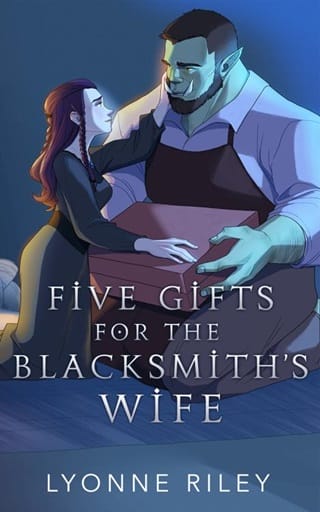Chapter 27
Chapter Twenty-Seven
Allison
Fiona’s steel-blue truck stopped in front of Trudy’s house just as I pulled into the driveway. The spry woman hopped out of the cab, moving like someone half her age. She gave a little wave, then pulled a bag from the back and headed up the driveway, catching up to us before we had even made it in the door.
Trudy visibly relaxed in Fiona’s presence. Relief flooded her features, and she finally let go of the death grip she had on my hand. “Oh, Fiona,” she said, her shoulders sagging. “I’m so glad you’re here.”
“There, there,” Fiona soothed, patting her gently and taking over as emotional support while I fumbled with the keys Trudy had shoved into my hand.
I got the door open and ushered her inside, helping her into the bedroom, where Fiona immediately began setting up equipment. I walked out and paced the living room, trying to decide what to do next. This was not okay. This was not a situation for a midwife. Truthfully, I had expected Fiona to tell the woman to go to the hospital when we called. Surely she knew how dangerous this situation was for the baby. We needed NICU and a full support team. It was the only chance the infant had.
I shook my head and clenched my fists, wishing I would have driven Trudy straight to the hospital no matter what she’d said. But I had told her I would take her home, and after saying that, I couldn’t bring myself to go against it. Something had to be done though, before this baby was born without a fighting chance.
With my mind made up, I took a deep breath, braced my shoulders, and headed toward the bedroom to take over.
Fiona came out as I did with a warning look on her face.
“Dr. Bell,” she said quietly, leading me away from the door. “You’re wound up tighter than a long-tailed cat in a room full of rocking chairs. Surely I don’t have to tell you that’s not helpful for Trudy.”
“Fiona,” I said, meeting her eyes. “We have to go to a hospital. You understand that, right?”
Fiona looked up sharply. “A hospital? No, I don’t think that’s needed right now. In fact, that would be the worst thing in the world.”
I forced myself to take a deep breath before responding, hoping it gave me at least a little bit of grace—though I was losing patience. “I understand you’re renowned as a midwife, but unless you know something I don’t, you’re not equipped to be a neonatal intensive care unit,” I said, unable to keep the sarcasm out of my voice.
Fiona’s face blanked. “NICU? Why in the world would you be thinking we need NICU? You haven’t even seen the babe yet.”
“Because,” I said, gritting my teeth, “I don’t have to see the baby to know. NICU is necessary one hundred percent of the time for a baby who hasn’t even fully formed his lungs yet .”
Fiona stared at me with confusion on her face before letting out a breath. “Oh, I think I understand,” she said, shaking her head. “Trudy told you she was due on September seventeenth, didn’t she?”
“Yes, that’s right.”
She waved a hand at me and headed toward the kitchen. “That’s just wishful thinking on her part.” She looked back at me over her shoulder with a faint look of amusement on her face. “Didn’t you realize she’s far beyond that?”
“What do you mean?” I sputtered, still standing in place.
“She’s thirty-seven weeks, dear.”
“What?” I was utterly confused. “Are you sure?”
Fiona nodded, fighting back a smile. “She came to me at six weeks and I’ve followed her the whole time. All the dates are logged in my notebook, if you need reassurance. Though I’m surprised an educated doctor like yourself didn’t notice the signs of late pregnancy or how her belly had already dropped.” She tried to keep her face straight, but she couldn’t hide her amusement. She was right, I was wrong, and it tickled her to death.
I paused and took a breath, thinking the situation over with different eyes. She wasn’t wrong. Trudy was a bit swollen and carrying quite low, though it wasn’t as if that were an exact indicator. She wasn’t nearly as large as I would have expected for being full term with a fifth baby, but I knew that some women were just blessed that way. When I had seen her, she was at sick call for a head cold—not a prenatal visit. I had asked her due date and accepted it as the gospel truth without thinking much about it. When I’d asked the date of her last period, she’d waved me off, saying she couldn’t possibly remember at this point. Even so, Fiona was right. I should have realized something was off.
“Why would she tell me she was due on September seventeenth?” I asked, still confused.
“Because September seventeen is the feast day for St. Hildegard.” Fiona chuckled. “She asked the saint for help conceiving. She argued with me the entire pregnancy that her baby would be born on the good saint’s feast day.”
“I see,” I said as I breathed out some of the tension I had been carrying. This wasn’t the emergency I’d thought it was. I was grateful but also annoyed with myself.
Fiona came back and patted my arm, her amused expression replaced by one of sympathy. “You may be one of our own, but you’re also new to town, so you don’t know Trudy. She’s what you might call a bit stubborn and more than a wee bit superstitious. You’ll have to learn to take what she says with a grain of salt.”
“Apparently,” I replied, shaking my head. How could I not have realized she was full term? “I feel like the most oblivious doctor in the world.”
“Don’t be so hard on yourself,” Fiona said with kindness in her voice. “And don’t be so hard on her, either. She’s had a rough time of it lately. Within the past three years, she’s lost her mother, her father, and her sister—all in hospitals, you see. Her sister died last year, not too long after giving birth, while they were all still at the hospital celebrating the new baby. Preeclampsia followed by a stroke.”
“That’s terrible,” I said, my annoyance gone as a wave of empathy rolled through me. “It’s so frustrating that, even with all our medical advances, tragedies like that still happen.”
“Yep,” Fiona said, nodding. “Very sad situation. Trudy can’t set foot in a hospital now without having a panic attack. It’s too tainted with death for her. The best place for her is here at home, where we can get her to calm down a bit. And you see, it’s not necessary after all, at least as far as we know right now. She’s a bit dramatic about labor, but I think we’re doing just fine.”
“Okay,” I said, nodding. It hit me that, despite all of my training, I still had a lot to learn about how to work with people in Rosemary Mountain. I hesitated, then swallowed my pride and asked, “Fiona, do you mind if I stay? I don’t want to take over or get in your way, but I’d like to help if I can. I’d like to, well, learn from you. There’s a lot I’ve forgotten about working with people instead of working for a system.”
Fiona beamed. “As long as it’s fine with Trudy, it’s fine with me. Besides, I wouldn’t mind the extra set of hands,” she admitted. “I’m not as young as I once was.”
“Thank you.” I started to ask her a question, but we were interrupted by a cry. We ran back to the bedroom, where Trudy was gripping the sheets, her face white as she worked through a contraction.
“Fiona!” she said when she could finally speak. “I need the ax!”
Fiona nodded solemnly. “I’ll get it.” She dashed off before I could ask.
I moved to Trudy’s side and attempted to soothe her. Fiona returned quickly, carrying a giant wood ax on her shoulder. I felt all the blood drain from my face as she moved toward the woman in the bed.
“What—” My jaw dropped. I didn’t even know what to ask.
Fiona showed her the ax, then crouched down and shoved it under the bed.
Trudy took a deep breath and smiled. “Thank you, Fiona,” she said, reaching out to squeeze the woman’s hand. “That’s better.”
“Of course, dear. I’m going to get the rest of my supplies, okay? Won’t be much longer now. You called me in the nick of time for this one.” Fiona tenderly stroked the woman’s hair away from her face.
Trudy smiled and nodded, looking peaceful even as another contraction began.
I followed Fiona out of the room. “What just happened?” I sputtered. “What in the world?”
“The ax,” Fiona explained. “It’s an old Appalachian tradition. It’s said to cut the pain.”
My jaw dropped. Again. “But that doesn’t work.”
Fiona’s face crinkled in amusement. “Seems to, doesn’t it?” she said, pointing to the bedroom where Trudy was no longer screaming in agony.
“But that’s ridiculous. It’s an ax.”
“I think you might prefer to think of it as a placebo effect,” Fiona said with a wink. “Sometimes, if you believe something works, it will. Now, come on. Help me carry in the rest of my things. It’s time to get serious.”
The woman marched out of the house on a mission, and I followed her, my jaw trailing somewhere behind me on the floor.
Time blurred then seemed to stand still altogether while I assisted Fiona. It was a completely different experience than the hospital births I had attended, and while part of me still longed for the support staff, monitoring equipment, and sterile environment of a hospital—and the knowledge that NICU was right around the corner—I had to admit that this felt different in a good way. Fiona was as cool as a cucumber, taking everything that came with practiced wisdom, as if she had done this a thousand times before—which she likely had. She was probably more experienced than any doctor in labor and delivery at our little hospital.
Trudy had calmed significantly with Fiona’s presence and with the ax—a placebo effect I still wanted to shake my head at but couldn’t deny. The room felt peaceful, filled with sacred expectation, when she finally pushed her baby into our world.
A healthy nine-pound baby with a head full of black hair and a cry that spoke of lungs as fully developed as I could have possibly hoped for.
“He’s beautiful,” I gasped, already half in love, as Fiona placed him gently on his mother’s bare chest.
“Every baby is,” Fiona said, laughing. “But he’s a handsome one, alright. That hair! And look at that smile. It’s a good sign, you know. A smiling newborn means he has angels watching over him.”
“That he does,” Trudy said, a blissful look of happiness settling on her as she stroked the sweet babe’s cheek. He did indeed appear to be smiling, though I knew it was just a reflex smile and not a real one. But this time, I was wise enough not to ruin the moment.
“What are you going to name him?” I asked.
“I think I’ll name him Gabriel,” she replied, still gazing with love and adoration at this child she had just birthed. “If his daddy approves, that is.”
“Did I hear my name?” A disheveled man ran into the room. “I’m sorry it took me so long to get here. Did I miss it all?” His eyes lit up when he spied the baby on his wife’s chest, and he rushed over to get his first real look.
Trudy laughed. “You did. Once he decided he was coming, he came quickly.”
“He’s perfect,” the man said, his voice thick with pride. “Has he got all ten fingers and all ten toes?”
Fiona laughed. “He does. I counted ’em twice. We’ll give you two a minute, then be back to deal with the rest.” She motioned for me to follow her out of the room.
“That was wonderful,” I whispered as we closed the bedroom door behind us, giving the couple a moment of privacy with their newborn son. I felt almost high from the experience—and from the utter relief that Fiona was right and NICU wasn’t needed after all.
“It always is.” Fiona grinned. “Never gets old. Makes all the hard work worth it.”
“You’re very good at what you do,” I said.
“I am,” she agreed with a twinkle in her eye.
I wanted to hug her and ask her a million questions, but all my attention shifted when I caught sight of Jackson.
 Fullepub
Fullepub 



